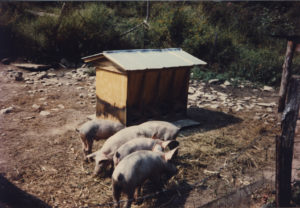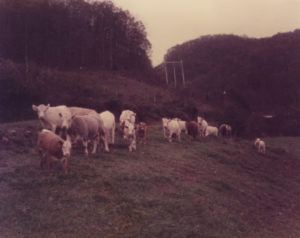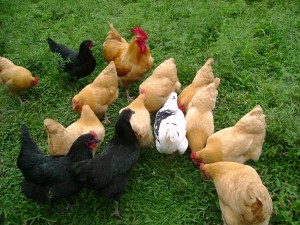Homesteading and Raising Livestock
go.ncsu.edu/readext?679307
en Español / em Português
El inglés es el idioma de control de esta página. En la medida en que haya algún conflicto entre la traducción al inglés y la traducción, el inglés prevalece.
Al hacer clic en el enlace de traducción se activa un servicio de traducción gratuito para convertir la página al español. Al igual que con cualquier traducción por Internet, la conversión no es sensible al contexto y puede que no traduzca el texto en su significado original. NC State Extension no garantiza la exactitud del texto traducido. Por favor, tenga en cuenta que algunas aplicaciones y/o servicios pueden no funcionar como se espera cuando se traducen.
Português
Inglês é o idioma de controle desta página. Na medida que haja algum conflito entre o texto original em Inglês e a tradução, o Inglês prevalece.
Ao clicar no link de tradução, um serviço gratuito de tradução será ativado para converter a página para o Português. Como em qualquer tradução pela internet, a conversão não é sensivel ao contexto e pode não ocorrer a tradução para o significado orginal. O serviço de Extensão da Carolina do Norte (NC State Extension) não garante a exatidão do texto traduzido. Por favor, observe que algumas funções ou serviços podem não funcionar como esperado após a tradução.
English
English is the controlling language of this page. To the extent there is any conflict between the English text and the translation, English controls.
Clicking on the translation link activates a free translation service to convert the page to Spanish. As with any Internet translation, the conversion is not context-sensitive and may not translate the text to its original meaning. NC State Extension does not guarantee the accuracy of the translated text. Please note that some applications and/or services may not function as expected when translated.
Collapse ▲ In the last couple weeks we have all seen the memes on Facebook making jokes about homesteaders not seeming so weird anymore. All jokes aside the threat of COVID-19 to our grocery store shelves probably has most people wishing they had paid a little more attention to grandma/mom all those times when they were trying to teach us how to can and preserve foods and raise our own gardens. Homesteaders have been priding themselves forever on the fact that their property or small farm is sustainable for their family, a lot of times having enough left over to share with neighbors or family as well. For most this includes some type of livestock whether it be sheep, goats, cattle (beef or dairy), or chickens and other poultry.
In the last couple weeks we have all seen the memes on Facebook making jokes about homesteaders not seeming so weird anymore. All jokes aside the threat of COVID-19 to our grocery store shelves probably has most people wishing they had paid a little more attention to grandma/mom all those times when they were trying to teach us how to can and preserve foods and raise our own gardens. Homesteaders have been priding themselves forever on the fact that their property or small farm is sustainable for their family, a lot of times having enough left over to share with neighbors or family as well. For most this includes some type of livestock whether it be sheep, goats, cattle (beef or dairy), or chickens and other poultry.
 The types of livestock included on a homestead or farm is usually determined by climate, size of the farm, what forage or food source options are available for livestock, available market if the homesteader chooses to sell some animals or product, and just plain old personal preference of experience. Some argue that it is much cheaper and certainly easier to purchase all of the meat your family will consume rather than raising it, and while this may be true let me invite you to consider the peace of mind that raising your own meat, dairy products, and eggs can give you and money can’t buy. Home-raised meat is born, raised, and processed with food for the family in mind. This isn’t to say that commercially raised meat isn’t just as healthy, however, if raising is at home the family can individualize their meat and other products to fit their personal wishes. One other factor that is worth much consideration, especially in light of recent events, is that in the event of an emergency, whether it be economically or otherwise, a livestock producer would then hold an extremely valuable food source. No longer completely dependent on their local grocery store or meat counter as so many have been recently.
The types of livestock included on a homestead or farm is usually determined by climate, size of the farm, what forage or food source options are available for livestock, available market if the homesteader chooses to sell some animals or product, and just plain old personal preference of experience. Some argue that it is much cheaper and certainly easier to purchase all of the meat your family will consume rather than raising it, and while this may be true let me invite you to consider the peace of mind that raising your own meat, dairy products, and eggs can give you and money can’t buy. Home-raised meat is born, raised, and processed with food for the family in mind. This isn’t to say that commercially raised meat isn’t just as healthy, however, if raising is at home the family can individualize their meat and other products to fit their personal wishes. One other factor that is worth much consideration, especially in light of recent events, is that in the event of an emergency, whether it be economically or otherwise, a livestock producer would then hold an extremely valuable food source. No longer completely dependent on their local grocery store or meat counter as so many have been recently.
 Not only could our family farms become more self-sustaining but our children can learn so many amazing things from having livestock on our farms. To start they learn a very important lesson about the lifecycle and how death plays an important role in that cycle. Like it or not death is a fact of life, it’s not a question of “if” but “when”. We should be preparing our children to deal with those facts of life and how to appreciate the miracle of life while it lasts. Children also learn about personal responsibility and having a daily job and tasks to accomplish on the farm. This lesson is critical to children becoming responsible adults who will be able to take over our farms and other businesses someday and remain successful. Without them who will feed the world?
Not only could our family farms become more self-sustaining but our children can learn so many amazing things from having livestock on our farms. To start they learn a very important lesson about the lifecycle and how death plays an important role in that cycle. Like it or not death is a fact of life, it’s not a question of “if” but “when”. We should be preparing our children to deal with those facts of life and how to appreciate the miracle of life while it lasts. Children also learn about personal responsibility and having a daily job and tasks to accomplish on the farm. This lesson is critical to children becoming responsible adults who will be able to take over our farms and other businesses someday and remain successful. Without them who will feed the world?
If you are currently doing some type of homesteading and would like to incorporate livestock into your operation or would like to start now and begin some type of homesteading or raising livestock, please contact N.C. Cooperative Extension. Our wealth of knowledge and resources can help put you on track for success. Please contact Kendra Fortner at the N.C. Cooperative Extension of Jackson County office at 828-586-4009 or the N.C. Cooperative Extension of Swain County office at 828-488-3848 or by email at kendra_norton@ncsu.edu.




